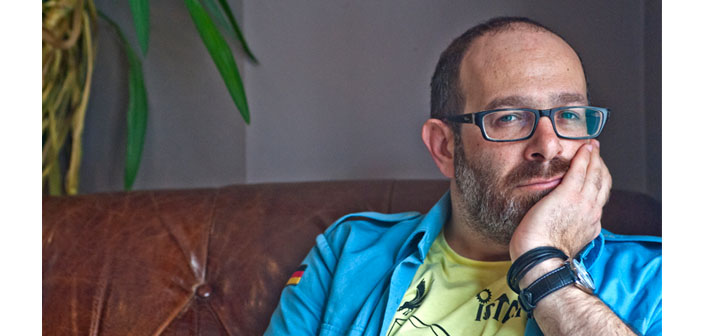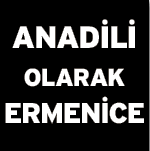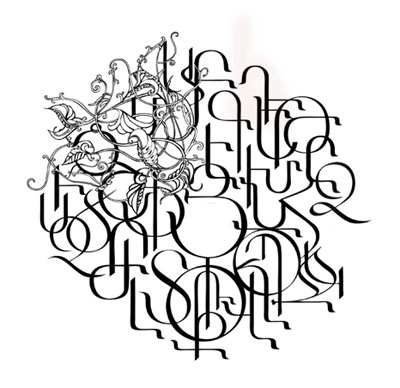Ermenice yabancı dil değil ki sonradan öğrenilsin!


2008 yılını ‘Uluslararası diller yılı’ ilan eden Birleşmiş Milletler Eğitim Bilim ve Kültür Örgütü (UNESCO), aynı yılın 19 Şubatı’nda yayınladığı ‘Tehlike Altındaki Diller Atlası’ kapsamında, konuşulan mevcut 6700 dilin 2400’ünün yok olma tehdidi altında olduğunu belirtmişti. Bu atlasa göre Türkiye’de de 18 dil kaybolma tehlikesi yaşıyor. O dillerden biri de Batı Ermenicesi. Her geçen gün Batı Ermenicesi konuşan insan sayısının azalması Türkiye’deki Ermeni toplumunu endişelendirse de son dönemde gençlerin bu dile ilgisi, Batı Ermenicenin kaybolmaması konusundaki umutları attırıyor. 21 Şubat Dünya Anadil Günü vesilesiyle Batı Ermenicesinin Türkiye’deki Ermeniler için önemini ve dilin buradaki yansımalarını Jamanak gazetesi editörlerinden Pangaltı Mıhitaryan Lisesi Ermenice öğretmeni filolog Sevan Değirmenciyan’la konuştuk.
UNESCO’nun Ermeniceyi ‘kaybolma tehlikesi altındaki diller’ kategorisine almasından sonra bu konuyla ilgili gerek burada gerek diasporada ne gibi çalışmalar yapıldı?
Diasporada özellikle Kalust Gülbenkyan Vakfı’nın son dönemlerde büyük çabaları var. Pek çok toplantı yaptılar, ben de son ikisine katıldım. Burada şunu görüyoruz, her ülkede yaşayan Ermenilerin bizimkiyle benzer sorunları, kaygı ve endişeleri var. Kimse yalnız olmadığını ve bir dayanışma içinde olduğunu fark ediyor. Bu çalışmaların yapılması bu açıdan güzel. Bu gibi çalışma ve toplantıların İstanbul’da da yapılması gerekiyor. Biz, sorunun yalnızca okullarda olduğunu düşünüyoruz ama bunların dışında da cemaatten farklı kesimler var ve onlar da benzer kaygıları yaşıyorlar. Yerel çalışmalar yaparak bu durumu geriye çevirebiliriz.

Peki, günümüzde Batı Ermenicesi gerçekten tehlike altında mı?
Öncelikle şunu söylemek lazım, son dönemde yapılan bazı çalışma, toplantı ve hareketler var, bunların hepsinin konusu Batı Ermenicesi ekseninde dönüyor. Bu kadar çalışma yapılması, zaten hali hazırda bir telaş, bir endişenin olduğunun en somut kanıtlarından biri. Yadsınamayacak derecede endişe söz konusu olduğuna göre bir tehlikeden de bahsedebiliriz. Bu tehlike UNESCO tarafından da tescillenmiş durumda. UNESCO, bundan birkaç yıl evvel Batı Ermenicesini ‘Kaybolma tehlikesi altındaki diller’ kategorisine aldı. Bu bağlamda mevcut bir tehlikeden bahsedebiliriz, evet.
Türkiye endeksli konuşacak olursak, bu tehlikenin boyutu nedir?
Türkiyeli Ermeniler için Ermenicenin, günlük konuşma dili olduğu sorgulanır hale geldi. Ermenice eğitim veren okullarımızda bile çocuklar sadece derste Ermenice konuşup okuldan çıktıklarında Türkçe konuşmaya başladılar. Okulda Ermenice bile konuşuyorlarsa eve geldiklerinde ne kadar Ermenice konuşuyorlar, bu da sorgulanabilir. Öncelikle şunu söylemek isterim ki, biz, Ermeniceyi öğretilecek bir dil olarak kabul etmeye başladığımız anda zaten yaşanır bir dil olmaktan çıkarıyoruz ve bu da zaten büyük bir sorun. Çocuk veya genç biri, bunun öğrenilen bir dil olduğunu ama hayatta herhangi bir karşılığı olmadığını görüyor. Bu biraz da bizim hatalarımızdan kaynaklandı. Ermenice zaten öğrenilmesi değil, yaşanması gereken bir dil. ‘Hoca alıştırmaları veriyor, ben bu alıştırmaları çözüyor, öğreniyorum, bunun dışında herhangi bir çaba sarf etmeme gerek yok’ gözüyle bakıyor çocuk Ermeniceye. Çocuklar bunun yaşanılan bir dil olduğunu da düşünmüyor. Mesela şöyle düşünelim: Bütün Türkçe konuşanlar, bilenler, Sabahattin Ali mi okuyor? Hayır, adam 500 veya 1000 kelime de olsa kendi hayatında bunu yaşıyor diyelim. Fakat biz, çocuklardan çok şey bekliyoruz gibi. Ermenice konuşanın Krikor Zohrab eserlerinin okuması gerektiğini talep eder konumuna gelebiliyoruz. Hayır, çocuk Ermeniceyi güle oynaya, yaşayarak konuşmalı. İnsanların onlara aşklarını bu dille yaşayabilmesini aşılamamız, kavratmamız gerektiği yönünde bir çalışma yapmalıyız diye düşünüyorum.
Türkiyeli Ermeniler için Ermenice ne zaman yaşanması değil, öğrenilmesi gereken bir dil haline geldi?
Bence bu biraz Türkiye’nin ve Türkçenin gelişmesiyle de alakalı. Bir yere kadar rekabet edecek ölçüdeydik fakat Türkiye’de yaşadığımız kültür ne zaman ki rekabet edilemeyecek hale geldi, biz geri kalmış olduk. İnsanlar ‘Ermenice neye yarar?’ dediği zaman çok üzülüyorum. Bizim bu soruyu sormamamız lazım, çünkü biz Ermeniceyi kimlik aktarmak için bir araç olarak görüyoruz ama diğer taraftan Türkiye’de yaşayıp Ermeniceyi bilmeyen insanlar Ermenice öğrenme çabasındalar çünkü bu dil Türkiye tarihi için çok önemli bir konuma sahip. Ben bunu öğrencilerime çok söylüyorum. Biz Ermenicenin neye yaradığını sormamalıyız, Ermenicenin pek çok şeye yaradığını, bunun farkına varmamız gerektiğini öğrenmeliyiz. Biz aslında Ermeniceye sahip olarak doğduğumuz için doğrudan meslek sahibiyiz. Biz edebiyatçı olabiliriz, tarihçi olabiliriz, üniversiteye girdiğimiz zaman aslında birçok yerde bize öncelik tanıyacaklar çünkü biz Ermeniceye sahibiz ve bu Türkiye tarihi için İngilizceden daha önemli bir durum.
İstanbullu Ermenilerin Ermenicenin gerekliliğine dair algısını nasıl değerlendiriyorsunuz?
Gerekli görmeyen çok insan var ama bu onların yanlışı. Çoğu zaman ailelerimiz bizi üniversite okumaya teşvik ediyor ve hepsinin kafasında çocuklarının doktor, mühendis olma arzusu var. Ne ki çoktur, o değersizdir. Birçok doktor, mühendis, ekonomist var... Ama az olan şey değerlidir. Biz, o az olana sahibiz. Gençlerimizin biraz gözlerini açıp, etraflarına bakıp aslında uzmanlık alanları olarak da Ermeniceyi kullanıp geliştirme lüksüne sahip olduklarının farkına varmaları, okullarımızın da bu farkındalığı çocuklarımıza aşılaması lazım.
İlkokullar Ermenice için ne gibi bir önem arz ediyor?
Bu duruma şöyle bakıyorum. Ben annem ve babamla hep Ermenice konuşuyorum çünkü böyle alışmışım. Askere gittiğimde ailemle konuşamıyordum, çünkü orada muhakkak Türkçe konuşman gerekiyor, ben konuşmamayı yeğliyordum. Bugün bu alışkanlığı kendi arkadaşlarıyla kazandırmak açısından bence anaokulu, ilkokul ve daha sonra gelen orta okul ile lisenin önemi çok büyük. Bugün bizim sorunumuz anaokulu, ilkokul veya orta okulda değil, daha çok lisede başlıyor çünkü çocuk lisede Ermenice konuşmamaya başlıyor. Hayatı artık Ermeniceyle kavrayamayacağını lisede düşünüyor ki bu yanlış. Ermenice sadece okul dili değil, aynı zamanda aşk dili, sokak dili. Öğrenciler bunun karşılığını göremedikleri için yavaş yavaş bir kopuş oluşuyor, bu kopuş kaçınılmaz hale geliyor.

Peki, bu durum nasıl daha iyiye gider?
Eğer gençler konuşmuyorsa, sorunu gençlerde buluyorsak, onları yönlendirmememiz lazım, onlara ‘şunu şöyle yazın’, ‘böyle konuşun’ demememiz gerekiyor. Yanlışı düzeltme durumu çok olmuştur, önce bunun üstesinden gelmeliyiz çünkü bu durum teşvik etmemeye de götürür olayı. Bizim her zaman için ‘konuş’, ‘yaz’ dememiz, teşvik etmemiz lazım. Çocuklar, gençler yanlış da olsa Ermenice konuşmalı, yazmalı diye düşünüyorum. Bir şey yazıyorlar, ister istemez ‘Ben bunu Ermeniceyle yazamam’ diyorlar, yaz, yanlış da olsa yaz, ben oturup tek tek düzeltmeyeceğim yazdıklarını ama sen yazdıktan sonra zaten alışkanlığı kazanacaksın ve hatalarını tek tek kendin düzelteceksin.
Ermenice diasporadaki ülkeler için değil belki ama Türkiye için çok önemli bir dil çünkü aynı zamanda Ermenice bir direniş dili. Türkiye sınırları içinde sırf Ermenice konuşmak bile bir direniş göstergesi. Dört tarafımız milliyetçi bir ideolojik baskıdayken senin Ermenice yaşaman, konuşman bile bir şeye karşı gelmen demek. Gezi Parkı’nda olsun, Kamp Armen’de olsun gençler pankartlarını Ermeniceyle yazdılar. Kurtuluş sokaklarında gezdiğinizde Ermeniceyle duvar yazıları görüyorsunuz. Bu gibi örnekler, Ermenicenin Türkiye’de çok da vahim olmadığını gösteriyor, demek ki bir bilinç var. Ama bunun hayattaki karşılığını daha çok görmemiz lazım. Etrafımda Ermenice konuşmaya çabalayan birçok genç görüyorum. Bu, çok güzel bir şey. Tam da bu nedenden ötürü oturup kara kara düşünmüyorum Ermenicenin halini. 50 bin kişilik toplumun hepsinden Ermenice konuşmasını da beklemiyorum elbette, ama, ufak da olsa bir hareketlenme, bir kıpırdama var.
Şöyle bir durum da var, biz geçmişi çok idealize ediyoruz. Eskiden şöyleydi böyleydi diyoruz ama Anadolu’nun büyük şehirlerindeki Ermenilerin çoğunun Türkofil olduğunu da görüyorsun. Diğer taraftan Ermeniceyi yeniden fethetmek bizi çok daha farklı bir kültürle karşı karşıya getirecek. Aslında çok büyük bir kültürü ıskalamamak adına bu dili öğrenmemiz, konuşmamız, bu dille üretmemiz lazım.
Türkiyeli Ermenileri üretmeye nasıl teşvik etmeli?
Üretme, ikinci bir aşama. Önce buradaki Ermeniler, bu dille yaşamaya başlamalı. Tarihte, farklı bir dille yazmaya başlamış fakat daha sonra derdini Ermeniceyle ifade eden birçok yazarın varlığına rastlıyoruz. Örneğin Mıgırdiç Margosyan, önce Türkçeyle yazmış, daha sonra Ermeniceye dönmüş. Keza Rober Haddeciyan da öyle. Çok önemli bir romancı olan Gostan Zaryan eserlerini İtalyanca ve Fransızcayla yazmaya başlamışken daha sonra kalemini Ermeniceye yöneltmiştir. Bazı Türkiyeli Ermeni edebiyatçıların da dili çok yalındır, basittir mesela. Zaven Biberyan, Garbis Cancikyan, Zahrad gibi önemli edebiyatçılar aslında Ermeniceyi çok basit bir dille kullanıyorlar. Gençler bu bilinci edindikten sonra üretime de geçmeyi imkânsız görmeyip, bir çaba içine girerek yayınlatmaya başlayabilirler.



